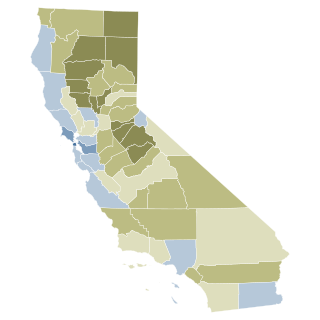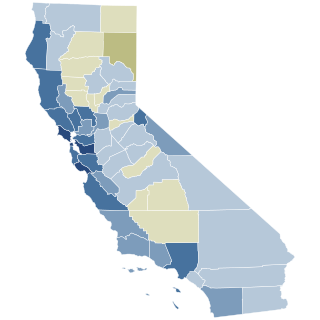
In California, a ballot proposition is a referendum or an initiative measure that is submitted to the electorate for a direct decision or direct vote. If passed, it can alter one or more of the articles of the Constitution of California, one or more of the 29 California Codes, or another law in the California Statutes by clarifying current or adding statute(s) or removing current statute(s).

Proposition 218 is an adopted initiative constitutional amendment which revolutionized local and regional government finance and taxation in California. Named the "Right to Vote on Taxes Act," it was sponsored by the Howard Jarvis Taxpayers Association as a constitutional follow-up to the landmark property tax reduction initiative constitutional amendment, Proposition 13, approved in June 1978. Proposition 218 was approved and adopted by California voters during the November 5, 1996, statewide general election.

California Proposition 6, also known as the Safe Neighborhoods Act and The Runner Initiative, is a statutory initiative that appeared on the November 2008 ballot in California. This proposition was rejected by voters on November 4 of that year.

A California Congressional Redistricting Initiative, Proposition 20 was on the November 2, 2010 ballot in California. It was approved by 61.2% of voters. Election officials announced on May 5 that the proposition had collected sufficient signatures to qualify for the ballot. The measure is known by its supporters as the VOTERS FIRST Act for Congress.
Proposition 19, also known as the California Marijuana Initiative (CMI), was a ballot initiative on the November 7, 1972 California statewide ballot. This was the first attempt to legalize marijuana by ballot measure in the history of the United States. If it had passed, the measure would have removed penalties in the State of California for persons 18 years of age or older for using, possessing, growing, processing, or transporting marijuana for personal use. The California Marijuana Initiative's organizers coordinated a huge grassroots organizing drive to place the measure on the ballot. The initiative qualified for the November statewide ballot in June 1972. The initiative was defeated by the voters with 66.5% No votes to 33.5% Yes votes.
Bail in the United States refers to the practice of releasing suspects from custody before their hearing, on payment of bail, which is money or pledge of property to the court which may be refunded if suspects return to court for their trial. Bail practices in the United States vary from state to state.

Marsy's Law for Illinois, formally called the Illinois Crime Victims' Bill of Rights, amended the 1993 Rights of Crime Victims and Witnesses Act by establishing additional protections for crime victims and their families. Voters approved the measure as a constitutional amendment on November 4, 2014. It became law in 2015.

Proposition 218 is an adopted initiative constitutional amendment in the state of California that appeared on the November 5, 1996, statewide election ballot. Proposition 218 revolutionized local and regional government finance in California. Called the “Right to Vote on Taxes Act,” Proposition 218 was sponsored by the Howard Jarvis Taxpayers Association as a constitutional follow-up to the landmark Proposition 13 property tax revolt initiative constitutional amendment approved by California voters on June 6, 1978. Proposition 218 was drafted by constitutional attorneys Jonathan Coupal and Jack Cohen.

The California state elections in 2020 were held on Tuesday, November 3, 2020. Unlike previous election cycles, the primary elections were held on Super Tuesday, March 3, 2020.

California state elections in 2018 were held on Tuesday, November 6, 2018, with the primary elections being held on June 5, 2018. Voters elected one member to the United States Senate, 53 members to the United States House of Representatives, all eight state constitutional offices, all four members to the Board of Equalization, 20 members to the California State Senate, and all 80 members to the California State Assembly, among other elected offices.

California Proposition 6 was a measure that was submitted to California voters as part of the November 2018 election. The ballot measure proposed a repeal of the Road Repair and Accountability Act, which is also known as Senate Bill 1. The measure failed with about 57% of the voters against and 43% in favor.

Proposition 12 was a California ballot proposition in that state's general election on November 6, 2018. The measure was self-titled the Prevention of Cruelty to Farm Animals Act. The measure passed, by a vote of about 63% Yes to 37% No.
In re Kenneth Humphrey was a case decided by the California Supreme Court concerning whether it is a violation of due process and equal protection to imprison defendants prior to trial solely because they cannot afford to pay bail.

Proposition 16 is a California ballot proposition that appeared on the November 3, 2020, general election ballot, asking California voters to amend the Constitution of California to repeal Proposition 209 (1996). Proposition 209 amended the state constitution to prohibit government institutions from considering race, sex, or ethnicity, specifically in the areas of public employment, public contracting, and public education. Therefore, Proposition 209 banned the use of race- and gender-based affirmative action in California's public sector.

California Proposition 15 was a failed citizen-initiated proposition on the November 3, 2020, ballot. It would have provided $6.5 billion to $11.5 billion in new funding for public schools, community colleges, and local government services by creating a "split roll" system that increased taxes on large commercial properties by assessing them at market value, without changing property taxes for small business owners or residential properties for homeowners or renters. The measure failed by a small margin of about four percentage points.

Proposition 22 was a ballot initiative in California that became law after the November 2020 state election, passing with 59% of the vote and granting app-based transportation and delivery companies an exception to Assembly Bill 5 by classifying their drivers as "independent contractors", rather than "employees". The law exempts employers from providing the full suite of mandated employee benefits while instead giving drivers new protections:

Proposition 21, an initiative statute for local rent control officially called the Expands Local Governments’ Authority to Enact Rent Control on Residential Property, was a California ballot proposition that appeared on the ballot for the general election on November 3, 2020 and was rejected. If approved, it would allow local governments to establish rent control on residential properties that have been occupied for over 15 years. It would also allow landlords who own no more than two homes to exempt themselves from such policies. This would essentially repeal some of the provisions in the 1995 Costa–Hawkins Rental Housing Act. Proposition 21 was rejected by 60% of California voters, just like Proposition 10 was before it.
Federal referendums were held in Switzerland on 7 March, 13 June, 26 September, and 28 November 2021. Swiss referendums take three forms: popular initiatives, which are citizen proposals to create a new law and require 100,000 valid signatures on a petition to get on the ballot; facultative or optional referendums, which are citizen proposals to approve or reject a piece of existing law and require 50,000 valid signatures on a petition to get on the ballot; and mandatory referendums, which are required to revise the constitution, join an international organisation or introduce emergency federal legislation for over a year.

Proposition 1, titled Constitutional Right to Reproductive Freedom and initially known as Senate Constitutional Amendment 10 (SCA 10), was a California ballot proposition and state constitutional amendment that was voted on in the 2022 general election on November 8. Passing with more than two-thirds of the vote, the proposition amended the Constitution of California to explicitly grant the right to an abortion and contraceptives, making California among the first states in the nation to codify the right. The decision to propose the codification of abortion rights in the state constitution was precipitated in May 2022 by Politico's publishing of a leaked draft opinion showing the United States Supreme Court overturning Roe v. Wade and Planned Parenthood v. Casey in Dobbs v. Jackson Women's Health Organization. The decision reversed judicial precedent that previously held that the United States Constitution protected the right to an abortion.










